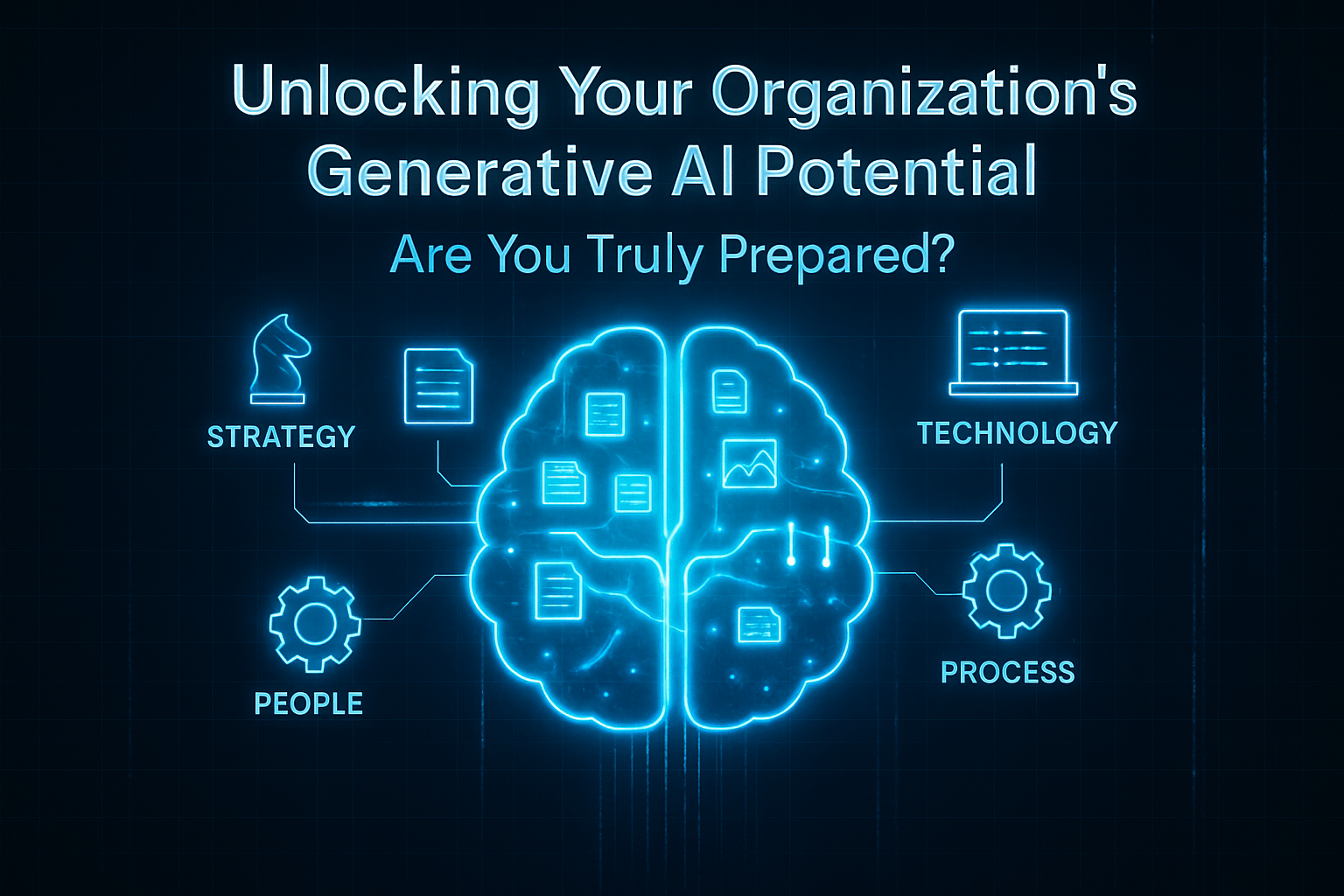Unlocking Your Organization’s Generative AI Potential: Are You Truly Prepared?

Generative AI is no longer just a buzzword—it’s a game-changer that’s revolutionizing how businesses create content, engage with customers, and innovate products and services. This blog kicks off a series designed to guide business and technology leaders through the journey of integrating Generative AI into their organizations. We’ll cover everything from readiness assessments to ethical considerations and deployment strategies, offering practical advice to help you maximize the value of Generative AI.
The Generative AI Revolution
Generative AI has the power to create human-like text, generate images from descriptions, and even write code. Its potential impact is enormous, whether it’s personalizing marketing content at scale or speeding up software development. The possibilities are endless, and businesses across industries are rushing to adopt this technology.
However, many organizations are jumping into Generative AI without fully preparing themselves. A report by Accenture found that 45% of organizations faced significant challenges in their AI projects due to insufficient preparation, leading to costly delays and disappointing results. This highlights the importance of thoroughly assessing your organization’s readiness before diving into Generative AI.
Why a Generative AI Readiness Assessment Is Crucial
A readiness assessment tailored for Generative AI is more than just a formality—it’s a strategic necessity. Unlike traditional AI, Generative AI presents unique challenges, such as ensuring content originality, navigating ethical issues, and integrating AI with creative processes.
For instance, imagine an e-commerce company that used Generative AI to create product descriptions. Without a proper readiness assessment, the AI produced inaccurate and even plagiarized content, leading to legal problems and dissatisfied customers. A thorough evaluation of the company’s data practices, content systems, and AI governance could have prevented these issues.
The Four Pillars of Generative AI Readiness: A Strategic Framework
To help you assess your organization’s readiness for Generative AI, we’ve developed a framework with four key pillars: Strategy and Value, People, Process, and Technology. Each pillar includes a set of questions to guide your assessment, using a 5-point scale to evaluate where your organization stands.
1. Strategy and Value
- Do you have a clear Generative AI strategy aligned with your business goals?
- Is there a roadmap outlining key initiatives and milestones for Generative AI?
- Are there metrics in place to measure the success and impact of your Generative AI efforts?
- Do you have a governance structure to ensure ethical and responsible AI use?
- Have you allocated a dedicated budget and resources for Generative AI projects?
2. People
- Does your organization have the necessary Generative AI skills and expertise?
- Is there a talent pipeline for AI roles within your company?
- Are business users trained to work effectively with Generative AI tools?
- Do you foster a culture of innovation and experimentation with AI?
- Are there mechanisms for sharing knowledge and collaboration related to Generative AI?
3. Process
- Do you have a defined Generative AI development lifecycle?
- Are there processes for data acquisition, cleaning, and preparation specifically for Generative AI?
- Is there a robust model development, testing, and deployment process in place?
- Do you monitor and evaluate the performance of your Generative AI models?
- Is there a strong data governance framework to address the unique challenges of Generative AI?
4. Technology
- Do you use cloud platforms like AWS, Azure, or Google Cloud for the heavy computational workloads required by Generative AI?
- Do you have the necessary AI and machine learning platforms (e.g., TensorFlow, PyTorch) to develop and deploy Generative AI models?
- Can you leverage pre-trained models like GPT-4 or DALL-E and adapt them to your specific needs?
- Do you have the tools and infrastructure for efficient model training, experimentation, and deployment?
- Are there cybersecurity measures in place to protect your data and intellectual property?
By answering these questions and applying the 5-point scale, you can gain a detailed understanding of your organization’s readiness for Generative AI. This framework will help you prioritize your efforts, allocate resources effectively, and ultimately drive more successful AI initiatives.
Conclusion: The Road Ahead
Generative AI has the potential to revolutionize industries, but unlocking this potential requires more than enthusiasm—it demands a strategic and methodical approach that begins with a comprehensive readiness assessment. The framework outlined here serves as a blueprint for success, helping you evaluate your organization across Strategy and Value, People, Process, and Technology.
But this is just the beginning. In our next article, we’ll explore how Generative AI can open up new revenue streams, enhance customer experiences, and optimize operations. We’ll share case studies of companies that have successfully implemented Generative AI, showcasing the tangible ROI and competitive advantages they’ve achieved. Stay tuned as we continue to uncover the transformative power of Generative AI and guide you on the path to maximizing its value for your business.
